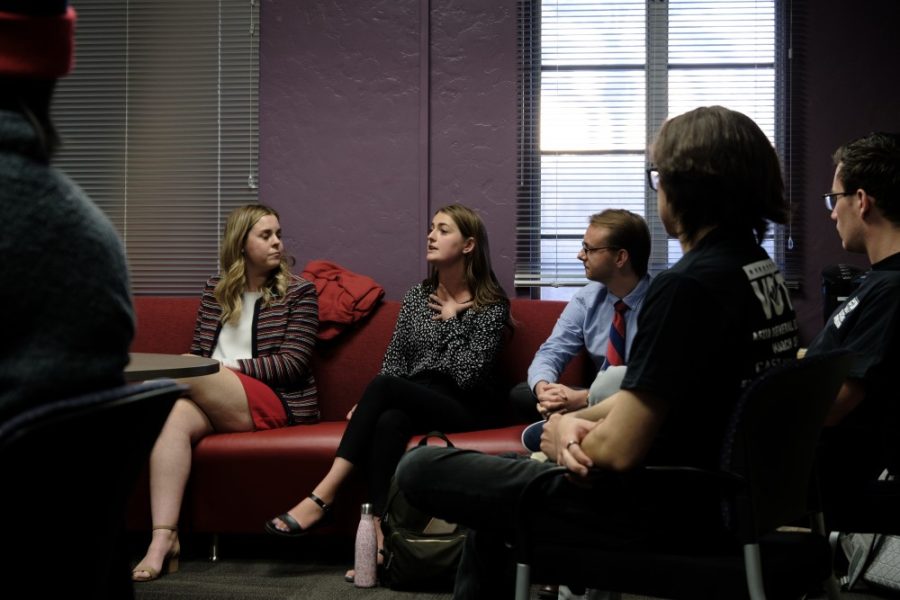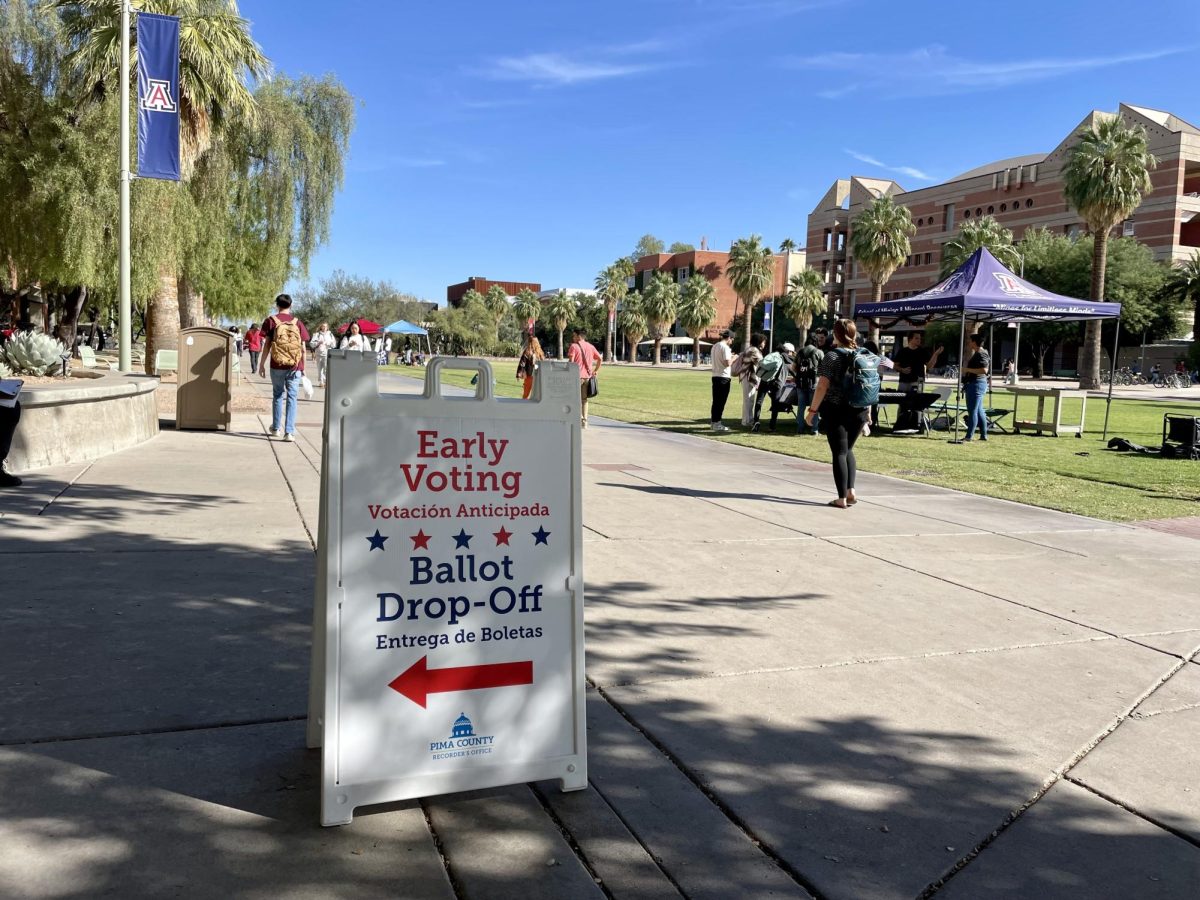Last year, the Associated Students of the University of Arizona, the UA’s undergraduate student government body, faced a crisis. While many candidates competed for the student body presidency, ASUA failed to fill a number of college-specific seats in the Senate.
With no candidates running, ASUA was forced to appoint students to the seats. ASUA’s incoming executives and senators at the time promised this would not happen again.
Yet, after a year of increased outreach to the UA community and easing of requirements for potential candidates, ASUA is facing a similar problem in this year’s March 25 and 26 general election.
Quality if not Quantity
Unlike last year, ASUA will only have to appoint one senator to the new Senate’s College of Architecture, Planning & Landscape Architecture seat.
This fact is overshadowed by a different kind of problem – one ASUA hasn’t faced in many years.
RELATED: Students express concern over lack of diversity in ASUA election at cultural forum
After pushing back this year’s ASUA elections to late March, Marlon Freeman, ASUA’s elections commissioner, was also forced to cancel ASUA’s primary elections.
“I have decided to cancel the ASUA primary elections due to the fact such elections would not eliminate any candidates,” Freeman told the Senate on Feb. 20. “It would be counterintuitive to have two elections that are identical.”
The impact, or lack thereof, of ASUA’s efforts to spark student interest in its elections and activities remained unclear until the official announcement of ASUA candidates.
For the first time since 2010, it was announced that only one candidate was seeking to become UA’s student body president. ASUA’s two vice presidential positions each also have only one candidate.
Matthew Rein, ASUA’s current executive vice president, said he was not too disappointed in this lack of competition.
“Of course we certainly want as many candidates to apply as possible, but I always think you should have quality candidates over simply a numerical quantity of candidates,” Rein said.
This lack of numerical quantity also extends to the election of ASUA’s senators. The majority of UA students who visit ASUA’s election website to cast a vote will find only one race where their vote will have an impact on the election’s outcome.
Other than students in the College of Social and Behavioral Sciences, every other student will only be selecting three at-large senators from a pool of five candidates.
Freeman summed up the situation: “I would have liked to see more candidates for each position, but personally, I’m proud in the sense that we were able to fill essentially 90 percent of the positions but one.”
Low Interest, Low Turnout
Low student interest is not new to ASUA. Past ASUA elections have generally only garnered votes from 10 to 15 percent of UA’s undergraduate student body.
“Everyone is so busy in college, not everyone wants to be involved, and that is okay,” said Brennen Feder, current senator for the College of Education.
RELATED: ASUA Senate provides students with chance to learn about candidates
According to Feder, ASUA’s mission is to serve every student regardless of whether they want to be involved in student government or not and to always advertise that the door is open to those who do want to participate.
“This past year, I have hosted many information sessions to get the word out about positions available in ASUA,” Freeman said.
According to Rein, who, as executive vice president, oversees the Senate, ASUA’s current senators all hosted informational sessions in their colleges to recruit candidates to run for Senate positions. For Freeman and Feder, there are a number of reasons not every student on campus was receptive to these outreach sessions. Freeman cited how the negative connotations of student government many students developed in high school and the multitude of other opportunities to get involved on campus affect students’ interest in ASUA.
“Some students care about ASUA, others do not,” Feder said. “Not even our professors can make 100 percent of students care about their classes.”
Critics from Within and Without
As part of ASUA’s increased outreach around its elections, Freeman also reached out to the UA’s deans and cultural centers. During a forum this year hosted by ASUA’s executive candidates geared towards the UA’s cultural centers, ASUA faced criticism from students and administration for not being accessible to all UA students.
Nikki Mastrud, ASUA’s executive diversity director, criticized all three executive candidates for failing to engage with marginalized communities on campus. Kendal Washington White, the UA’s Dean of Students, attended the Q&A session for the executive candidates on Thursday and said ASUA also has a reputation of being an exclusive club.
These perceptions that ASUA’s executive offices are reserved for those who have been in student government since their freshman year, combined with a stipend that some within ASUA, like Rein, argue is too low, create barriers for candidates considering running for office. Even those within ASUA are not immune to these barriers. Only three of ASUA’s current senators and executives decided to run for re-election, even though many will remain on campus.
Many, like Feder and Noah Huang, senator for College of Fine Arts, cited their heavy workloads and a desire to be involved in other aspects of student government, like ASUA’s programs or the position of student regent, in their decisions not to seek re-election. For Rein, fresh faces keep new ideas and voices coming to ASUA.
“A lot of senators have a good experience … it’s always good to have fresh and new ideas come in,” Rein said. “That’s not to say folks who would re-run would not be good, but it’s good to have new folks to come in and bring their new perspective to their own colleges.”
Renewed Calls for Outreach
During this election campaign, many of ASUA’s future senators and executives have promised to improve ASUA’s outreach and better share ASUA’s accomplishments and goals with students.
“ASUA provides a lot of added value to students. Look at our services like Campus Pantry that serves over 500 students a week. Even if students don’t know about ASUA, ASUA is working behind the scenes for them, fighting for lower textbook costs and more,” Feder said.
RELATED: Leaders of tomorrow: Get to know the ASUA executive candidates
During a Q&A organized by Freeman, Sydney Hess, the only candidate for student body president, called for new events and activities to more effectively engage with students and hear their voices and concerns.
“What I propose that we do is hold two public town halls per semester and potentially have those in cultural centers,” Hess said.
The UA community will likely not be able to see the impacts of these new promises for outreach until the candidates for next year’s ASUA elections are announced.
Follow Randall Eck and Priya Jandu on Twitter









